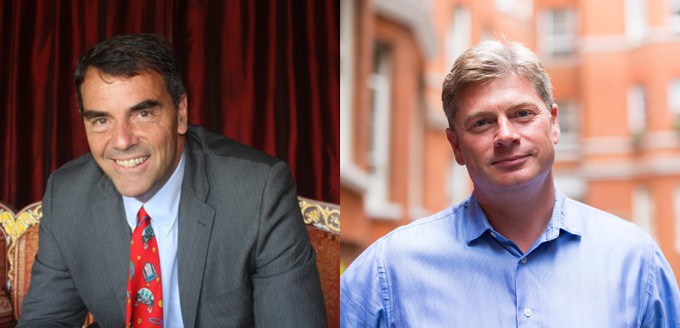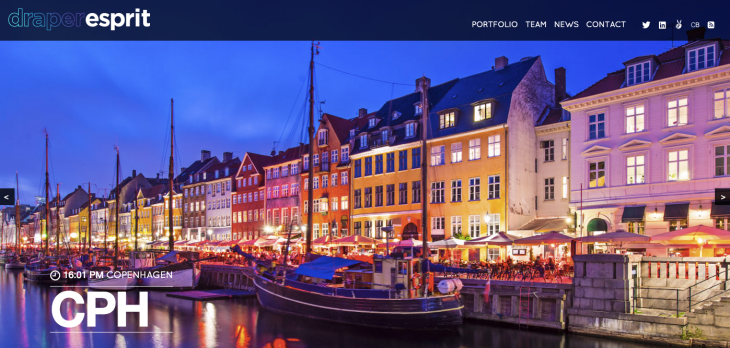DFJ, the storied Silicon Valley venture capital firm, has built out a global presence not just through direct investments but through a network of firms that are affiliated with the mothership yet raising and investing from their own funds. Now that network is going through some changes, and with it comes a new role for one of the firm’s founders. The DFJ Network has rebranded to the Draper Network, and Tim Draper is stepping up his involvement and investments in the network’s largest member, London-based Draper Esprit (formerly called DFJ Esprit).
There are three different developments here: the rebranding is the latest stage of evolution in the Network, which was restructured in 2013 to give it more autonomy and remove DFJ’s carry in any deals. And Draper getting more interested in international is the latest stage in his own evolving investment career, after stepping away from an investing role in DFJ in 2013. Meanwhile, Draper Esprit, run by Simon Cook (below right with Draper, left), has seen a lot of personnel changes this year.

Draper getting more involved in Europe is not entirely out of the blue, of course. Among the dozens of companies he’s invested in is Skype, one of the most successful tech startups to come out of this region.
But it is also part of a bigger and more recent shift that we are seeing among U.S. VCs to widen their net and focus more on Europe. Other activity includes the likes of Google Ventures opening an office in London a year ago to spearhead investments in the region; and others like Sequoia, Peter Thiel’s Valar Ventures, and Union Square Ventures all building out their portfolios with investments in promising new startups from the old world.
Draper Esprit has arguably been one of the VCs leading that charge, but also on a different track. Founded nine years ago, it was an early mover in the franchising model, raising and administering its own funds, while remaining connected to the original DFJ by way of the DFJ Network. Draper Esprit’s portfolio today — which includes Lyst, Trustpilot, Movidius, Miura, Fluidic Analytics, and CurrencyFair — has a collective valuation of about $4 billion, the company says. And at a time when venture investments in tech have continued to heat up, there has been an acceleration in the capital that these startups are raising — some $250 million in the last six months alone.
We’ve heard that Draper Esprit is now raising for a new fund, one place where having Draper getting more involved could help grease the wheels.
As the VC embarks on its next stage, we had a chat with Tim Draper about Europe, and what he sees as the opportunities here. What follows is an edited version of that exclusive conversation.
TC: Why are you choosing now to focus more on Europe?
Tim Draper: Europe is really interesting right now, it feels like its moment is now. The regulations are right — for example crowdfunding laws are much more appropriate in the UK than they are in the U.S. Estonia is showing the way in areas like digital voting and digital identity measures. And Greece has a big opportunity to take on Bitcoin and eschew any fiat currency.
There are gaps and holes in the current market that will get bigger, and we’ve got a major opportunity to fill those holes with technology. This is an amazing opportunity for Europe to leapfrog and become an economic powerhouse. It turns out that regulators around the world are not keeping up on the amazing changes in tech and it’s hard for them to let go. But the new world is going to be organized by the governments who get with it. Europe is in a good position to do that.
TC: What will it mean, practically, for you to be stepping up more in Europe?
TD: I get deal flow from all over the world already. Now, I will be more actively pursuing that in Europe, spending more time here.
For me travel happens when I see an interesting opportunity happening. I think there will be more entrepreneurs coming from the ground in europe because it’s been held down by bureaucracy for so long. Now everyone is thinking of solutions to problems. It’s great.
TC: There have been arguments for and against Bitcoin saving Greece, so to speak. What do you see as the opportunity?
TD: Bitcoin is an obvious one. You can jump into it through remittances but they should all be using Bitcoin. It may not seem obvious but then again Skype was also a non-obvious deal. Greece is a great opportunity if you are an entrepreneur. There is also cloud based government services [to bring down costs], smart contracts — just so many great opportunities to jump into.
None of these things happen overnight. From when things get going to when they become readily availbale usually will take five to six years. My guess is that some entrepreneur is thinking of how to reinvent the Greek economy.
TC: Have you placed a target on how much you’d like to invest in European startups in that time? What areas are you focusing on?
TD: I suspect that it will have to do with a lot of how much we raise and where the opportunities are, but assuming that the catastrophe in Greece actually creates opportunity, I suspect we will be putting a lot more money into Europe. Over the next five years? I don’t know. I hate putting numbers on that.
As for what to invest in, I’m always looking for interesting and transformative financial, medical, government and education technologies. Basically, anything that is limited by bureaucracy will be a big opporutnity for entrepreneurs, and those are the things that i am looking for.
TC: One trajectory European startups often take is to move over to the U.S. to raise money and grow. Zendesk, Spotify and many others have taken this route, and Euro founders have lamented that it’s hard to find VCs here willing to make big growth investments, to attract that kind of attention from the U.S. when you are not “on the ground” there. Do you think that can change over time, or will Silicon Valley always be that tech magnet/generator?
TD: For starters, there are going to be more and more European startups, which will affect this. Also, I believe that geographic borders are going to fall when it comes to how those startups operate and get financed. Money is going to move more freely throughout the world. There will be less friction and the world is opening up globally. People who fund late stage companies in Europe are going to come from all over the world. Just as those who fund in the U.S. are coming from all over the world today. [Uber is one key example of this.] It’s a global phenomenon and will become even more so.
Regulation helps to keep money in bulge bracket firms. From the other end of the spectrum, platforms like AngelList are really democratizing how capital is raised.
